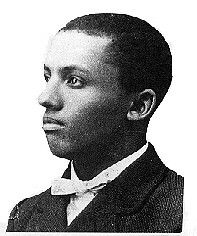
Dr. Carter G. Woodson (1875-1950), as a young man. He was a graduate of Harvard where he received a Ph.D in History
Originally uploaded by Pan-African News Wire File Photos
Carter Godwin Woodson was born on December 19, 1875 at New Canton, Va. He was an American historian who first opened the long-neglected field of black studies to scholars and also popularized the field in the schools and colleges of blacks.
To focus attention on black contributions to civilization, he founded Negro History Week in 1926. This celebration and remembrance would later evolve into Black History Month.
Carter was born of a poor family. He supported himself by working in the coal mines of Kentucky and was thus unable to enroll in high school until he was 20. After graduating in less than two years, he taught high school, wrote articles, studied at home and abroad, and received his Ph.D. from Harvard University (1912).
In 1915 he founded the Association for the Study of Negro Life and History to encourage scholars to engage in the intensive study of the past as it related to Africans and their descendants through the world.
Prior to this work, the field had been largely neglected or distorted in the hands of historians who accepted the traditionally biased picture of blacks in American and world affairs. In 1916 Woodson edited the first issue of the association's principal scholarly publication, The Journal of Negro History, which, under his direction, remained an important historical periodical for more than 30 years.
Woodson was dean of the College of Liberal Arts and head of the graduate faculty at Howard University, Washington, D.C. (1919-20), and dean at West Virginia State College, Institute, W.Va. (1920-22). While there, he founded and became president of Associated Publishers to bring out books on black life and culture, since experience had shown him that the usual publishing outlets were rarely interested in scholarly works on blacks.
Important works by Woodson include the widely consulted college text The Negro in Our History (1922; 10th ed., 1962); The Education of the Negro Prior to 1861 (1915); and A Century of Negro Migration (1918). He was at work on a projected six-volume Encyclopedia Africana at the time of his death. Woodson died on April 3, 1950, in Washington, D.C.
Many people ask why Black History Month is in February. It is not some conspiracy to designate the shortest month to our remembrance as some would think. It is also not in honor of Fredrick Douglas who was born in February.
Woodson chose February because even though the 13th Amendment to the constitution was signed in January which abolished slavery, slaves did not start to hear of the news until February. So that is why Woodson chose February. (He could have chosen June when slaves in the Mid Western states got the word but that is a debate for another time.
------------------------------------------------------------------------------
BIBLIOGRAPHY.
Jacqueline Goggin, Carter G. Woodson: A Life in Black History (1993).
No comments:
Post a Comment